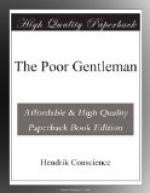“Why dost thou want to leave us, dear little bird?” said she, softly. “Why dost thou wish to be gone, dear comforter of our sadness? Sing gayly to-day; father is well again, and life is once more a pleasure. What is it makes thee flutter about so wildly and pant in thy cage? Ah! is it not hard, dear little one, to be captive when we know there are joy and freedom in the open air?—when we are born in the fields and woods?—when we know that there alone are independence and liberty. Like thee, poor bird, I am a child of nature; I too have been torn from my birthplace; I too bemoan the solitudes where my childhood was passed! But has a friend or lover been snatched from thee—as from me—forever? Dost thou grieve for something more than space and freedom? Yet why do I ask? Thy love-season has come round again, has it not? and love is the greatest blessing of thy little life! I understand thee, poor bird! I will no longer be thy fate! Fly away, and God help you! Begone, and enjoy the two greatest blessings of life! Ah, how thou singest as thy wings bear thee away,—away to the sky and woods! Farewell! farewell!” As she uttered these last words Lenora opened the cage-door and released the bird, which darted away like an arrow. After this she resumed her work and sewed on with the same zeal as before, till aroused by the sound of footsteps on the staircase.
“It is father! God grant he may have been lucky to-day!”
Monsieur De Vlierbeck entered the room with a roll of paper in his hand, and, throwing himself languidly into a chair, seemed altogether worn out with fatigue. He had become very thin; his eyes were sunk in their sockets, his cheeks were pale, and his whole expression was changed and broken. It was very evident that sickness or depression, or perhaps both, had made fearful ravages on his body as well as spirits.
The poor old gentleman was wretchedly clad. It was evident that he had striven as formerly to conceal his indigence, for there was not a stain or grain of dust on his garments; but the stuff was threadbare and patched, and all his garments were too large for his shrunken limbs.
Lenora looked at him a moment anxiously. “You do not feel ill, father, do you?”
“No, Lenora,” replied he; “but I am very wretched.”
Lenora said nothing, but embraced him tenderly and then knelt down with his hand in hers.
“Father,” said she, “it is hardly a week since you were ill in bed: we prayed to God for your restoration, and he listened to our prayers; you are cured, dear father, and yet you give way anew at the first disappointment. You have not been successful to-day, father? I see it in your face. Well, what of it? Why should it interfere with our happiness? We have long learned how to fight against fate. Let us be strong and look misery in the face with heads up: courage is wealth; and so, father dear, forget your disappointment. Look at me. Am I sad? do I allow myself to be downcast and despairing? I suffered and wept enough when you were ill; but, now that you are well again, come what may, your Lenora will always thank God for his goodness!”




